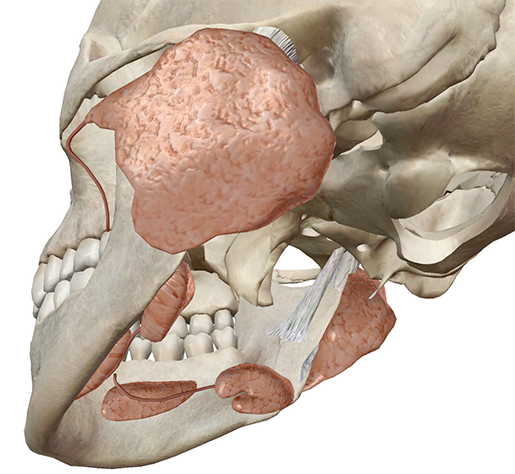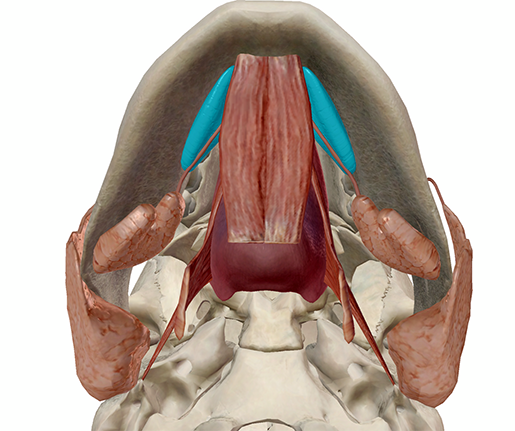Posted on 12/20/12 by Courtney Smith
Ever been so angry you could spit? If you're angry right now, please don't spit—it was just an expression.
As gross as spit is, it's also incredibly interesting. Your body puts a lot into making your saliva, regardless of what you're using it for (eating, keeping your throat dry, drooling into your pillow, etc.). What about it is so interesting, you ask? Read on, dear reader, and find out!
Not one, not two, but six glands in your head that produce nearly two liters of saliva every day. Your sublingual, submaxillary, and parotid glands work together to keep your mouth and throat from turning to dust. No, seriously, have you ever seen a dried-out mucous membrane? It's like watching The Mummy all over again.
 Image captured from Human Anatomy Atlas.
Image captured from Human Anatomy Atlas.
Actually, saliva is around 99.5% water, which is why it's so important for you to stay hydrated. In addition to water, enzymes and "buffers" (things that maintain a balanced pH level) help keep the status quo in the oral cavity.
If you've ever had a case of dry mouth, you'd have noticed that you weren't able to taste things very well. A dry tongue actually can't taste a thing! Chemicals in food need to dissolve in saliva for the taste buds in your tongue to detect them, and saliva constantly keeps the receptors nice and wet.
Talk about your gross headers, but there you have it. Ever notice that your mouth fills with saliva before you're about to vom? It happens because your body is trying to digest whatever is ailing it, and since digestion begins in the mouth your salivation mechanism is revved up.
Here's a helpful trick: if you ever get that feeling and your mouth begins to fill, don't swallow your saliva. That actually triggers vomiting. Spit it out and, chances are, you won't need a bucket.
 Image captured from Human Anatomy Atlas.
Image captured from Human Anatomy Atlas.
Don't even ask. But sometimes if you yawn, you'll briefly become a human fountain when a small stream of saliva erupts from under your tongue. This is due to the contraction of a muscle that pushes against the sublingual glands, which sends the saliva shooting out—sometimes at great distances!
When a dog gets hurt, what's the first thing it does? It licks its wound. To some degree, the same thing happens with humans. Ever notice that a wound in your mouth heals exponentially faster than a wound anywhere else in the body and never leaves behind a scar? This is because your saliva contains immune cells, antimicrobial and antifungal proteins, and growth factors that promote wound healing.
However, that only goes for wounds in the mouth. In addition to all those healing factors, your saliva is also chock-full of bacteria, which could infect a wound on your skin.
Be sure to subscribe to the Visible Body Blog for more anatomy awesomeness!
Are you an instructor? We have award-winning 3D products and resources for your anatomy and physiology course! Learn more here.
Additional Sources:
When you select "Subscribe" you will start receiving our email newsletter. Use the links at the bottom of any email to manage the type of emails you receive or to unsubscribe. See our privacy policy for additional details.
©2025 Visible Body. All Rights Reserved.